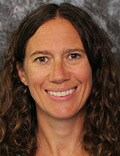SEATTLE — Counseling oncology patients about nutrition and dietary trends is part science and part art, according to Kerry McMillen, MS, RD, CSO, manager of Medical Nutrition Therapy at the Seattle Cancer Care Alliance in Washington.
"It's especially confusing for patients in the day and age of the Internet, when you can basically find proof of anything out there, positive or negative," she said here at a workshop at 2019 JADPRO Live, the annual meeting of the Advanced Practitioner Society for Hematology and Oncology (APSHO).
Ketogenic Diet
Take for instance the ketogenic diet. The hypothesis behind this diet is that tumors rely on glucose to meet their energy demands, so reducing glucose levels can starve them out, McMillen explained.

Kerry McMillen, MS, RD, CSO
"You know what? Sugar does feed cancer, but sugar feeds every other cell in our body, so it's not really just about sugar," she said. "We know that the relationship between sugar and cancer is more about glucose metabolic regulation, and when people have hyperglycemia for days on end, it increases the metabolic cascade that involves insulin-like growth factor 1 and changes the environment and how your cells behave."
There aren't any rigorous trials supporting efficacy of the ketogenic diet in the oncology population, although research is ongoing. Also, this diet can be at odds with American Institute for Cancer Research (AICR) recommendations to consume fruits, vegetables, and whole grains, and to limit red meat (which now includes pork and lamb) to no more than 18 oz per week.
"You really have to think about how do you balance survivorship needs with these diet approaches. That's something to talk through with patients," McMillen noted.
"If a patient does wish to go on a ketogenic diet, it's really important to realize that they are not going to get the full complement of vitamins and minerals that you would get in a healthy diet, so you definitely want to make sure that they are on a carbohydrate-free multivitamin with trace minerals, including selenium, and they are also getting calcium and vitamin D," she advised. "And we strongly encourage that they do get linked up with a dietitian, just so we can help them figure out what their food choices might be."
Alkaline Diet
Another hot nutrition topic among cancer patients is the alkaline diet. The hypothesis behind this diet is that tumors can't grow in an alkaline environment, so increasing blood pH through food choices can be beneficial.
However, "the science behind being able to change your blood pH is just not there," McMillen said, as the body's homeostatic mechanism works very hard to avoid alkalosis (and acidosis).
"It's really a marketing scam, trying to get people to buy very expensive alkalinized waters and water-dispensing machines that will fix your cancer because you are going to make your body more alkaline," McMillen asserted. "The bottom line is that promotion of an alkaline-based diet and alkalinized water for cancer prevention is not justified or evidence-based."
That said, alkaline foods fortuitously include fruits, vegetables, nuts, and lentils. "In my practice, I tell people that if they are eating healthy and meeting their calorie and protein needs, it's not a problem for them to eat high-alkaline foods because they are healthy foods," she said.
"It's when their diet starts to become so restrictive that they are not meeting their calorie and protein needs appropriately, and they are starting to lose weight. Then it's time to start thinking about opening up their diet," she added.
The Option of Fasting
Oncology patients have also increasingly been inquiring about fasting to reduce the side effects of chemotherapy or achieve weight loss. Here, there is evidence of health benefits for the norm of intermittent fasting, whereby one simply refrains from eating overnight.
"There are actually studies that show that intermittent fasting for 12 hours, 7 pm to 7 am, helps control blood sugar, lowers A1c, helps manage weight, and there has been some data showing that for breast cancer survival, it helps," McMillen said.
Commonly, foods consumed late at night are nutrient-poor and calorie-dense, too. "Our food choices might be less healthy overall when we are doing that kind of mindless eating," she noted. "It's important when people are talking about fasting that we investigate why are they eating at that time, and realize even some simple reductions or changes in what they are eating can help."
Then there are more extreme forms of fasting. Although data from small studies suggest that multiday fasting may reduce the toxicity of platinum-based chemotherapy, there are marked differences across tumors and chemotherapy regimens, and rigorous trials have not been done. In addition, patients at risk for weight loss (or are already underweight) who choose to fast can lose muscle mass and function.
"We are lacking evidence to be able to recommend fasting either 24 hours or multiday at this time. Until we have better, sound randomized controlled trials, it's not a nutrition recommendation that we stand behind as the certified specialists in oncology nutrition," McMillen summarized.
Sorting Myths From Facts
To help cancer patients navigate such nutritional gray areas, McMillen recommends having a dietitian with oncology expertise on the multidisciplinary team, making patients aware of prevention and survivorship guidelines, and pointing them to trustworthy information resources.
"Sometimes, you can kind of meet people where they are at and not get into really intense discussions about something they very firmly believe because that can alter your patient–clinician relationship. But it's important as practitioners that we are always able to stand by the latest evidence," she maintained.

Natalie Ledesma, MS, RD, CSO
"First, establish trust and rapport with patients, and then address the topic objectively and scientifically," agreed Natalie Ledesma, MS, RD, CSO, a clinical nutrition specialist at Smith Integrative Oncology in San Francisco and senior dietitian for the University of California, San Francisco Helen Diller Family Comprehensive Cancer Center.
"In all of my work, I want it to be evidence-based. So I try to keep out opinion and media and fad and hype, and just really kind of look at, here is what we know, here is what we don't know, and where does that lead us," she told Medscape Medical News.
When patients are adamant about following a diet that lacks evidence, the foremost consideration is safety, which may entail additional monitoring, Ledesma concurred. And importantly, clinicians should be careful not to alienate patients.
"If we turn a blind eye or are staunchly against a dietary approach — no, we can't do this or we can't do that — patients are just going to do what they want to do," she elaborated.
"So it's much more beneficial for our community and helping people with nutrition to be open, even if we are not necessarily in agreement, so that we don't close the door on them," Ledesma cautioned. "Because if we do, they are just simply going to not tell us about it, and then we can run into dangers and other negative consequences."
McMillen and Ledesma have disclosed no relevant financial relationships.
Advanced Practitioner Society for Hematology & Oncology Annual Meeting (JADPRO Live) 2019: Presented October 24, 2019.
For more from Medscape Oncology, join us on Twitter and Facebook
Medscape Medical News © 2019
Cite this: Oncology Patients Increasingly Ask About Diet: What to Say? - Medscape - Oct 29, 2019.










Comments